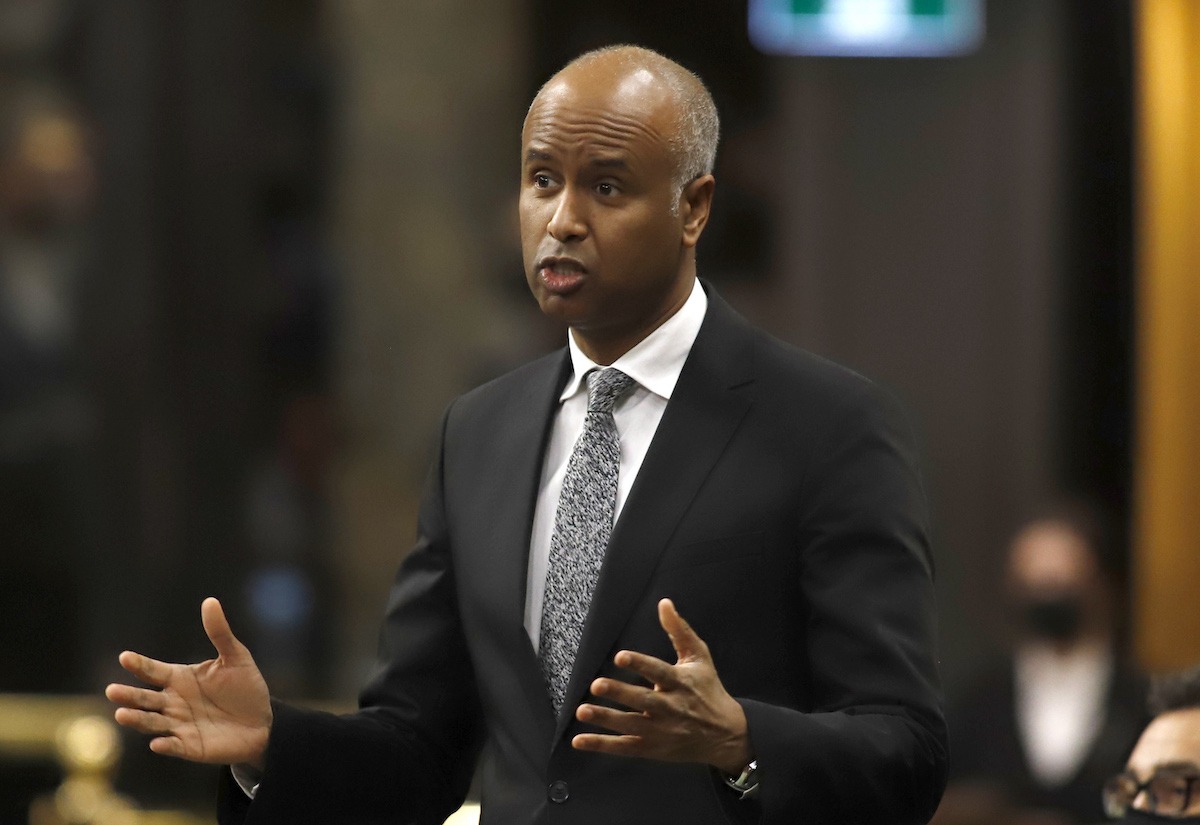Some topics are just too big to be covered in one column. That’s why, over the next two weeks, Max Fawcett will tackle the housing crisis and the ways we could address it in a series of them. First up: The need for more federal leadership. For more on this series, read the second, third, fourth and fifth instalments.
At a time when governments are still facing the challenges presented by the ongoing global pandemic, to say nothing of the financial repercussions associated with efforts to address it, you can understand why something like soaring housing prices would tumble down their list of priorities.
After all, more than two-thirds of Canadians own homes, and they aren’t particularly interested in entertaining the idea of the value of their single biggest asset going down. That makes it hard to have a meaningful conversation about the negative impact of rising prices on the lives of millions of Canadians, never mind talking about ways to reverse it. Mix in the reality that housing policy falls mostly under provincial and municipal jurisdiction and it’s easy to see why the federal government — and, to be clear, many successive federal governments — hasn’t put housing at the top of its political to-do list.
But after COVID-19 dumped a fresh load of gasoline on the fire that is Canada’s housing market, it should be clear to all but the most myopically self-interested homeowner that we have an uncontrollable crisis on our hands.
Housing prices have increased 50 per cent nationwide over just the last five years, and it’s no longer just places like Vancouver, Toronto and Montreal driving that surge. The latest leg up has seen the suburbs and exurbs of those overheated markets posting equally ludicrous price gains as potential homeowners get priced out of the big cities and try to find a foothold in the surrounding communities.
After dipping below $500,000 during the early stages of the pandemic, the average home price in Canada hit $720,850 in November — a new high.
Municipal and provincial governments have key roles to play here, whether it’s on zoning issues or supporting the development of more supply. But the federal government has the biggest and best arrows in its quiver, and it’s long past time it started using more of them.
The recently announced one per cent tax on vacant or underused housing owned by non-residents is a start, but it’s only expected to raise $200 million in its first year — a rounding error on a rounding error when it comes to the size of Canada’s housing market. Chrystia Freeland’s new mandate letter as finance minister also directs her to impose an anti-flipping tax on properties that aren’t held for at least 12 months.
These are mere branches when much heavier sticks are required, and every day the federal government nibbles at the edges of this problem is another day that it gets bigger and more difficult to deal with.
Yes, Canada has its first federal minister of housing ever in Ahmed Hussen, but he’s still without his own department and is responsible for other duties in his role (his title includes “Diversity and Inclusion”). That’s why it’s time to reconstitute the Department of Urban Affairs, one that existed briefly in the 1970s before getting phased out by the Liberal government of the time. And while we’re at it, let’s give it real teeth — and the ability to actually take a bite out of the housing crisis.
There are lots of ways it could do that, from investing more heavily in public housing (more on that later) to elevating the importance of renting and renters (we’ll get to that too). But regardless of which policy paths it chooses to follow, it has to stop habitually passing the buck to other jurisdictions.
Ironically, it was more than 50 years ago, under the leadership of the first Prime Minister Trudeau, that Canada initially tried to address a brewing national housing crisis. After winning party leadership in 1968 and forming a majority government later that year, Trudeau appointed his former rival Paul Hellyer to chair a Task Force on Housing and Urban Development.
But Hellyer resigned from cabinet after his report, which meant his series of ambitious recommendations — including far more federal involvement in the housing file — fell on deaf Liberal ears. The prime minister himself didn’t believe it was appropriate for the federal government to intrude on provincial jurisdiction. In time, and with pressure from the right places, he relented — and a brief golden age of federal involvement in Canada’s housing market was born, one whose legacy can still be seen today in some of our aging co-operative housing projects.
We need a much longer golden age now. As Hellyer wrote in his report, it was “illogical, if not inconceivable, that the Government of Canada could have ministries dealing with fisheries, forestry, veterans affairs, and other matters which involve a minority of the population, but none to deal on a full-time basis with the urban problems which involve more than 70 per cent of the population, not to mention housing which involves virtually everyone.”
Those urban problems have become more intractable in the decades since Hellyer tabled his report and now involve much more than 70 per cent of the population. History may not have repeated itself in 2021, but it’s hard not to hear it rhyming here.
Would potential federal intrusion on their jurisdiction bother the provinces? Almost certainly. But we’re long past the point where that can be used as a justification for inaction. Our biggest cities are in the process of committing a form of economic suicide, one in which the young people and new residents who create and sustain their vitality are being priced out of existence.
It may well be too late to reverse all the damage caused by the surge in house prices. But the federal government must step in before more is done — and more ground is lost in the process.
Next up: Why it’s time to stop the speculators, and how that could help fund investments in affordable housing.






Comments
The Federal Government should investigate foreign ownership. It seems it should be banned and that ban should be policed. Owners must be residents (tax records?). It seems to me, as I recall, that there exists already a declaration of citizenship on the purchase documentation; if not there should be. I am confident that this would influence the house (property) values dramatically especially in major centers such as Vancouver and Toronto.
Agreed on that idea; it's so obvious like so many big-picture solutions that it begs the question, why has this not happened already? Capitalism and neoliberalism of course, not to mention jurisdiction, and as far as another federal housing initiative goes, the unfortunate reality is that the majority of provincial governments are conservative, i.e. pure obstructionists when it comes to investing in people, and yet somehow keep getting elected by the same! So until more of the population grasps fully what conservative "governance" really means, the Liberals are left with just trying to barely hold onto the reins of power by pretending that the current iteration of conservatives haven't actually lost their minds, such as they were/are.
(The best part of "Don't Look Up" for me was when DiCaprio yelled this truth into the camera at close range. )
Meanwhile, in our Okotoks News, I just read an article on how a couple of towns in Alberta are building what look just like storage units to "house" some of the growing group of "people experiencing homelessness." Please insert an eye-roll emoji here in the context of this harsh climate that just served up minus 20 day and night for a couple of weeks, and it's only January. They're "experiencing it" allright. So some innovation is going on across the country, and climate change will probably dictate even more, the silver lining of both that and the pandemic hopefully being a growing realization of the need for humane governance which totally sidelines conservatives.
And yet, while we have many, many more single member households, the proportion of households renting and the proportion owning are pretty much the same as they've been historically, since at least 1990.
The proportion of renters was considerably higher before condos became a thing, when the phenomenon of "small owner landlords" became a thing: it drove up rents, too. Buying a rental building and converting it to condos within a week, giving tenants notice and selling individual condos was very lucrative. Tenants didn't usually have to actually move as far as their new landlords were concerned -- but their rents went way wa-ayy up: so on a practical level, they had to move. Within a short time, there was also an influx of foreign money, buying and sometimes developing large commercial properties -- followed by sell-outs of large commercial concerns, with many of those renters getting hit again: this time with loss of jobs, degraded share profits (for those whose pay increases had been in the form of profit sharing), and to make it worse, business owners absconded with their pensions. And governments let them do it: even enabled them.
Foreign ownership was limited to less than 50% of any parcel of land under a single title. Ownership of contiguous properties was not allowed. Developers built apartments as rental properties only.
What we have now is a lot more of is individuals owning multiple residential properties, and using them as generators of an income stream while watching value increase. Both rent and purchase prices increase for that reason.
As long as the predominance of purchasers are investor landlords, and as long as they keep jacking up rents, so will sale prices rise. (And as long as there are no rent controls, or they don't apply to all properties, rents will rise higher and higher -- and people at the lower end of the earnings spectrum become homeless: people who are housed elsewhere don't decide to come to Toronto and be homeless. And the homeless-shelters business is quite lucrative. Find out how much those banks of crappy cots in warehouse-sized spaces cost governments per night (they're night shelters only).
See:
https://newsofamerica.org/2021/10/24/this-investor-owns-17-homes-he-and…
The other thing that benchmarks the cost of houses is the cost of brand new. As developers have become more and more greedy that cost has risen exponentially: and
https://www.thestar.com/news/gta/2021/11/25/newly-built-houses-hit-reco…
Maybe costs did increase. But not to the tune of 30% a month, two months running!!! Developers and builders have a good gig, coming and going. Sales prices reflect greed, not costs.
And then there are the "pure speculators", who purchase property with no intention of anyone ever living in it, and sit there like toads waiting for a fly to come by, till land values (pushed upwards by lack of available supply) make selling too good a prospect to not do. Sure: put a capital gains tax on those properties, and make it at such a high rate that the whole prospect would deliver a loss to the dogs in mangers that the owners are.
Instead, we behave as though they are doing something laudable, while seniors who want to stay in the homes they carefully tended for decades, puttering amongst the tomatoes and vegies, and sharing the provender with young neighbours and their kids.
Sure: tax those who simply live in a place for a year, cash in and buy a bigger one, cash in and buy a bigger one, etc. They never really make "homes" of them: they live there, but don't become part of a neighbourhood, don't contribute to its social life, etc. They're just live-in toads, with a plan to head off to spots with more flies as soon as they can. Some don't even bother to furnish the places. How do I know? I've watched the phenomenon, and have lived in one spot long enough to see trends over the years.
I look for the information, because I worked in mixed law practices for a long time: one becomes aware of things one mightn't otherwise. I expect the same is true of almost any type of work continued over a period of time, in the same locale.
It might be interesting to see how many local politicians and higher-level municipal employees are involved in some of the very practices that push housing prices up.
So let's have an end on the crappola about forcing old folks to move into retirement homes, waiting for the next deadly pandemic, and quit whining that they have a spare bedroom or two, to put up family members when the kids come to spend Christmas holidays, or grandchildren come to spend summers. Some of them are still paying mortgages, because at the time when the price of houses was less, mortgage costs were so high that many of them sacrificed tremendously just to hang onto their patch of grass.
So many of the prescriptions for solving homelessness and high residential property costs cherry-pick facts and limit context to a very small and short frame of reference.
One could also consider that CMHC for decades just sat on its budget, till it was finally asked to return all that dough into the government's "general revenue" stream. Much of it went to the likes of carbon extraction, and enabling abuse of aboriginal propulations in other countries.